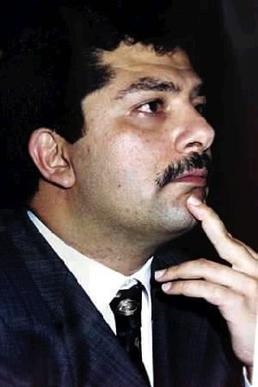
Qusay Saddam Hussein al-Nasiri al-Tikriti was an Iraqi politician, military leader, and the second son of Saddam Hussein. He was appointed as his father's heir apparent in 2000. He was also in charge of the Republican Guard. Qusay and his brother Uday were killed in a U.S. raid in Mosul.
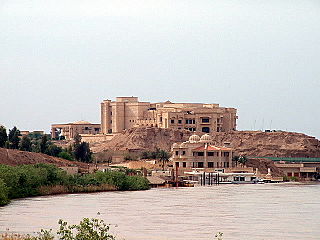
Tikrit is a city in Iraq, located 140 kilometres (87 mi) northwest of Baghdad and 220 kilometres (140 mi) southeast of Mosul on the Tigris River. It is the administrative center of the Saladin Governorate. As of 2012, it had a population of approximately 160,000.

The United States-led invasion of the Republic of Iraq was the first stage of the Iraq War. The invasion phase began on 19 March 2003 (air) and 20 March 2003 (ground) and lasted just over one month, including 26 days of major combat operations, in which a combined force of troops from the United States, the United Kingdom, Australia and Poland invaded Iraq. Twenty-two days after the first day of the invasion, the capital city of Baghdad was captured by coalition forces on 9 April 2003 after the six-day-long Battle of Baghdad. This early stage of the war formally ended on 1 May 2003 when U.S. President George W. Bush declared the "end of major combat operations" in his Mission Accomplished speech, after which the Coalition Provisional Authority (CPA) was established as the first of several successive transitional governments leading up to the first Iraqi parliamentary election in January 2005. U.S. military forces later remained in Iraq until the withdrawal in 2011.

The Iraqi no-fly zones conflict was a low-level conflict in the two no-fly zones (NFZs) in Iraq that were proclaimed by the United States, United Kingdom, and France after the Gulf War of 1991. The United States stated that the NFZs were intended to protect the ethnic Kurdish minority in northern Iraq and Shiite Muslims in the south. Iraqi aircraft were forbidden from flying inside the zones. The policy was enforced by the United States and the United Kingdom until 2003, when it was rendered obsolete by the 2003 invasion of Iraq. French aircraft patrols also participated until France withdrew in 1996.
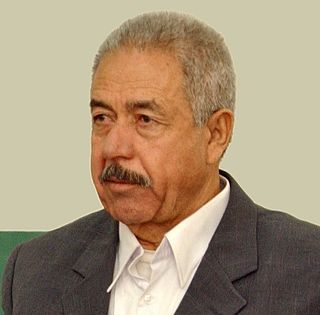
Ali Hassan Majid al-Tikriti, nicknamed Chemical Ali, was an Iraqi politician and military commander under Saddam Hussein who served as defence minister, interior minister, and chief of the Iraqi Intelligence Service. He was also the governor of Kuwait during much of the 1990–91 Gulf War.
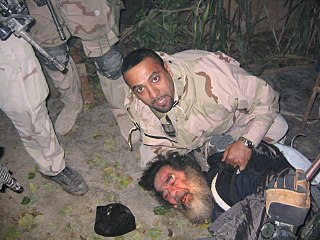
Saddam Hussein, the deposed president of Iraq, was captured by the United States military forces in the town of Ad-Dawr, Iraq on 13 December 2003. Codenamed Operation Red Dawn, this military operation was named after the 1984 American film Red Dawn.

Iraqi Airways Flight 163 was a Boeing 737-270C, registered YI-AGJ, that was hijacked in 1986. On 25 December 1986, en route from Baghdad's Saddam International Airport to Amman, Jordan, Flight 163 was hijacked by four men. Iraqi Airways security personnel tried to stop the hijackers, but a hand grenade was detonated in the passenger cabin, forcing the crew to initiate an emergency descent. Another hand grenade exploded in the cockpit, causing the aircraft to crash near Arar, Saudi Arabia where it broke in two and caught fire.
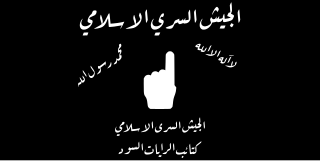
The Black Banner Organisation was an Iraqi guerrilla organization that battled multinational troops in Iraq. The organization's ideology was believed to be radical Sunni Islamism.

Stuart W. Bowen Jr., is an American lawyer who served as the Special Inspector General for Iraq Reconstruction (SIGIR) from October 2004 to October 2013. He previously served as the Inspector General for the Coalition Provisional Authority (CPA-IG), a position to which he was appointed in January 2004. Mr. Bowen's mission includes ensuring effective oversight of the $63 billion appropriated for Iraq's relief and reconstruction.

The 36th Commando Battalion is one of several Iraqi special forces units created after the fall of the Saddam Hussein. Originally part of the Iraqi Special Operations Forces Brigade, the unit has a role comparable to that of the United States Army Rangers. The unit is now designated as the 1st Commando Battalion, part of the 1st Special Operations Brigade.

The 1991 Iraqi uprisings were ethnic and religious uprisings against Saddam Hussein's regime in Iraq that were led by Shi'ites and Kurds. The uprisings lasted from March to April 1991 after a ceasefire following the end of the Gulf War. The mostly uncoordinated insurgency was fueled by the perception that Iraqi President Saddam Hussein had become vulnerable to regime change. This perception of weakness was largely the result of the outcome of the Iran–Iraq War and the Gulf War, both of which occurred within a single decade and devastated the population and economy of Iraq.

Lawrence F. Kaplan was editor of World Affairs and executive editor of The National Interest, both foreign policy magazines. He is also distinguished visiting professor at the U.S. Army War College. He was formerly a senior editor at The New Republic, where he wrote about U.S. foreign policy and international affairs. From 2005 to 2007, Kaplan reported for the magazine from Iraq. He has also written about foreign policy for The Wall Street Journal, The Financial Times, Slate, The New York Times, The Washington Post, and numerous other publications.

The Battle of Najaf was a major battle in the 2003 U.S. invasion of Iraq. The first stage of the battle was fought when the U.S. 3rd Infantry Division fought to surround the town. The second stage was fought when soldiers from the U.S. 101st Airborne Division fought to clear and secure the city.
Alphonso Van Marsh is an American journalist and war correspondent. He is based outside the United States.

Mahmoud Saeed is an Iraqi-born American novelist.
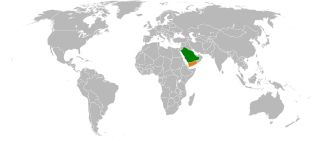
Saudi Arabia and Yemen relations refers to the current and historical relationship between the neighbouring sovereign states of Saudi Arabia and Yemen. The two countries at one time did enjoy good relations and closely cooperated in military, economic and cultural issues. Now because of the ongoing Yemeni Civil War and the realignments of power in the Middle East with the emergence of al-Qaeda and the radicalization of some factions of Islam, Saudi Arabia has led a military intervention into Yemen.

Iyad Futayyih was an Iraqi Army colonel general. He later served as the head of the Jerusalem Army. He started his service in the Army as an officer in an armoured unit, later fighting in the Iran–Iraq War, receiving numerous medals and suffering a severe head wound whilst leading an Iraqi counterattack against an Iranian offensive. In total Futayyih was awarded 27 medals during the Iran–Iraq War. He was perceived to be a staunch Saddam loyalist.

The siege of Basra, code-named Operation Karbala-5 or The Great Harvest, was an offensive operation carried out by Iran in an effort to capture the Iraqi port city of Basra in early 1987. This battle, known for its extensive casualties and ferocious conditions, was the biggest battle of the war and proved to be the last major Iranian offensive. The Iranians failed to reach their objective.

The Mosul Grand Mosque is an incomplete Sunni Islamic mosque located in Mosul, Iraq. The mosque is situated in the Taqafah district bordering the Tigris river near the Nineveh archeological site. Its construction started during the Saddam Hussein rule, but works were interrupted because of the political instability in the country and it remains incomplete to this day.
Operation Dawn-10 or Walfajr-10 was a large scale offensive operation launched during the Iran–Iraq War by Iran against Iraq on March 15, 1988 near the final stages of the war's conclusion. It was commanded by the Pasdaran along with the participation of some regular army forces as support. During Operation Dawn-10, Iran changed its operational area from southern to northern Iraq. The operation was started with the code of "Ya Rasūl Allāh (s)" (Persian: (یا رسول الله, and performed in 5 phases.


















